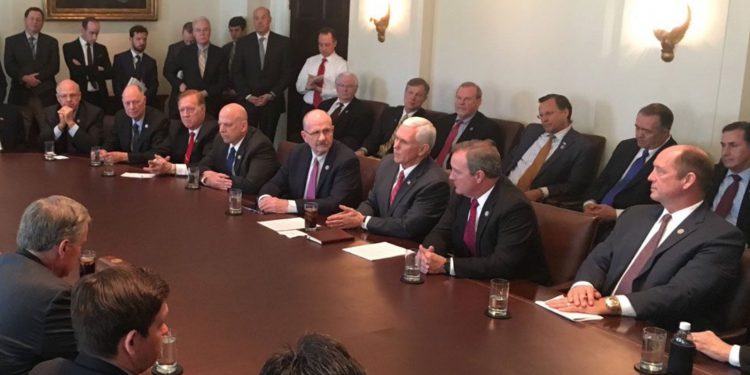US food policy making is like Donald Trump’s all-male panel on women’s reproductive health, an advocate told the White House this week.
Diane Sullivan of Equitable Spaces added that those vulnerable to food insecurity were made to believe their hunger was their own fault, and this shame was used to silence them.
On Tuesday, Ms Sullivan was opening one of six listening sessions held by the White House, gathering recommendations for new policies, which are due to be launched in September at a Conference on Hunger, Nutrition and Health.
Referring to the former presidency of Donald Trump, she said, “Do you remember a few years back when we bemoaned the all-male panel of experts called upon to discuss the reproductive health of women? Remember those optics? Pretty shocking. My friends this is us.”
Historically those with lived experience, “have been invited into these spaces only after the agenda has been set, and where our narrative conveniently suits it,” she said.
“Some of you you want to feed us like we feed our pets”
“We’re asked to put our trauma on display to be poked, prodded and occasionally applauded. To ultimately defend priorities that we didn’t help to define.”
Quoting Massachusetts congressman Jim McGovern “who was instrumental in breathing life into this conference,” Ms Sullivan said, “Hunger is a political condition. Hunger has persisted not for lack of food, our farmers and ranchers produce and we waste abundantly… But it is for lack of political will.”
She advised against dictating to recipients of support what food items they bought, saying, “Some of you I know for a fact want to feed us like we feed our pets.
“We are more than just data sets. We are whole and worthy human beings. Please see us as that first.
“If your intention for this conference is to ultimately design policy that will restrict access and choice to low-income consumers, may you be met with overwhelming resistance.”
“We are not broken, these unjust systems are broken”
Ms Sullivan, a mother and grandmother, has depended on food assistance on and off for 30 years, she said, also describing her community of friends and loved ones, “many of whom know the trauma of not knowing where their family’s next meal might come from, if it comes at all.”
Food poverty could only be solved by a living wage, and access to affordable housing, transport, energy costs, childcare and healthcare.
Ms Sullivan paid tribute to those on the call with experience of hunger, saying, “You do belong here in every space where solutions to hunger are being identified discussed and debated.
“You are a key informed stakeholder who’s been intentionally locked out of the rooms where decisions are being made on your behalf. And yet despite every obstacle along your path you’ve found your way here today. For that I applaud you.
“For so long experiencing hunger has been associated with personal failure, weaponising shame to silence our voices.
“Let history 50 years from now tell a different story. Let it tell of the time that we, those with lived experience and expertise, stepped into our power.
“We are not broken, these unjust, unsustainable and inequitable systems are broken. So, it’s time for us all to get to work.”























